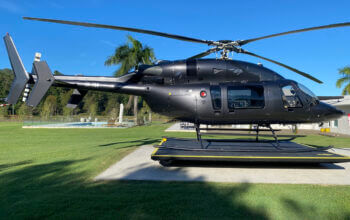
The University of Miami’s H125 has been specially equipped with an array of environmental sensors and instrument inlets. Donaldson Aerospace and Defense Photo
A unique flying scientific laboratory devoted to advancing environmental research will be on display in the Donaldson Aerospace and Defense exhibit 2400 during the Helicopter Association International Heli-Expo, March 1 to 3 in Louisville, Ky.
The featured Airbus H125 is equipped with an inlet barrier filtration (IBF) system from Donaldson Aerospace and Defense, a division of Donaldson Company, Inc.
The helicopter observation platform (HOP) is owned by the University of Miami Rosenstiel School of Marine and Atmospheric Science and operated by Helicopter Express.
Rosenstiel School Professor and Dean Roni Avissar, who pilots the H125, said the aircraft is key to obtaining vital information about climate and human health. Avissar will be available throughout Heli-Expo to answer questions at the Donaldson exhibit.
The H125 has been specially equipped with an array of environmental sensors and instrument inlets. As the helicopter flies at various altitudes and locations, equipment measures various exchanges between the Earth surface and atmosphere.
“A helicopter is the only platform that can safely and efficiently perform the maneuvers we require,” said Avissar. “In particular, the ability to fly low and slow is essential to our research.”
After Heli-Expo, Avissar will fly the helicopter to Florida to begin scientific missions in the Everglades and Biscayne Bay.
Dirt, dust, salt and sand ingestion rob a turboshaft engine of its ability to produce the power required for helicopter missions. Since the H125 will study the environment near the ocean and close to the ground, the IBF is critical to the long-term effectiveness of the helicopter.
In addition to protecting the helicopter’s engines, the IBF conserves the Rosenstiel School’s budget, which consists largely of federal grants and philanthropic support, by extending maintenance intervals and preventing damage to the helicopter’s valuable engines.
Avissar thanked Donaldson for its unwavering support of the program, adding, “When we were challenged by circumstance to equip the research platform with a proven air filtration system, Donaldson worked with us and went above and beyond to find a solution that will keep our program and research missions on track.”









